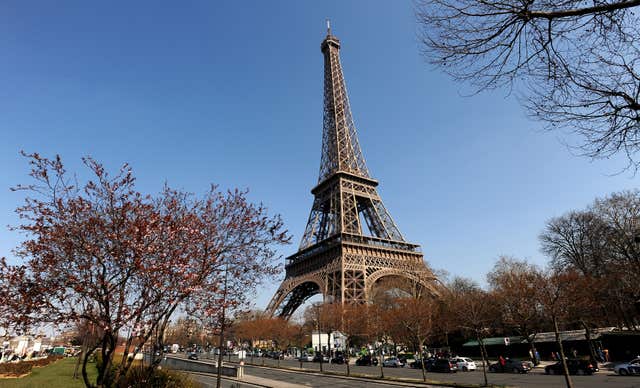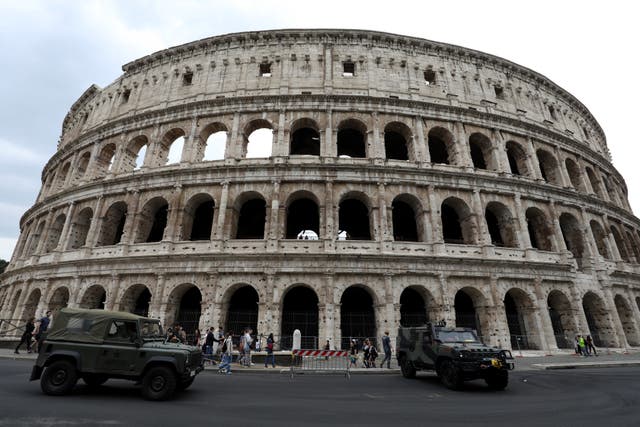
While much has been written about the easing of Covid-19 restrictions in the UK, other countries are having to introduce tougher measures to curb rising infections.
Much of Europe is being subjected to a third wave of Covid-19 with a spike in the number of cases.
The French government announced that new lockdown restrictions would be imposed on Paris from midnight on Friday due to an increase in cases.
Germany is among a host of European countries warning of an "exponential growth" in infections.
READ MORE: Coronavirus: Overseas summer holidays ‘extremely unlikely’, scientist warns
Data from the European Centre for Disease Prevention and Control shows 20 countries in the European Union have now reported an increase in the rate of positive tests with 15 also saying that hospital or intensive care admissions have increased.
Meanwhile, other countries have opted for curfews in a bid to reduce the rate of transmission.
The vaccine rollout across the EU has been hindered by delayed deliveries as well as the suspension of the use of the Oxford-AstraZeneca vaccine.
Yesterday, UK residents were warned that holidays to foreign destinations will be “extremely unlikely” this summer due to the risk of new Covid-19 variants being brought back into the UK, a scientist has warned.
Here is what we know about how some European countries are handling the pandemic amid a so-called third wave.
– France
France has seen a rise in cases in the last week, with over 35,000 new cases reported nationwide in France on Thursday.
 The Eiffel Tower in Paris (Andrew Matthews/PA)
The Eiffel Tower in Paris (Andrew Matthews/PA)
The numbers have steadily increased in recent weeks, and around 250 people are dying with Covid-19 each day.
New lockdown measures for Paris and several other regions will see non-essential shops close and restrictions on travel.
Its nationwide curfew from 6pm to 6am – which has been in place for two months – will now begin an hour later.
Prime Minister Jean Castex said France was facing a “third wave” of the pandemic, adding the new measures will last for four weeks.
There have been 4.25m confirmed Covid-19 cases in France so far and over 92,000 deaths.
– Italy
A nationwide nightly curfew remains in place preventing people from leaving home except for work, emergency or health reasons.
The country is divided into red, orange, yellow and white zones, depending on local infection rates.
In areas designated “red zones” – where the toughest measures are applied – non-essential shops are closed, while restaurants and cafes can only serve takeaway or delivery.
 The Colosseum in Rome (Steven Paston/PA)
The Colosseum in Rome (Steven Paston/PA)
Around 80% of schoolchildren nationwide have been stopped from attending classes in person.
From March 15, all regions with the exception of Sardegna were designated orange or red zones.
There have been more than 3.3 million cases of coronavirus in Italy since the start of the pandemic, with over 105,000 deaths.
READ MORE: Covid Scotland: What is lockdown ‘Level 0’ and when might rules end?
– Germany
Restrictions were slowly being eased across Germany, with bars, pubs and restaurants allowed to resume outdoor service from March 22 in areas with low case numbers.
Despite some restrictions easing, it would appear that some restrictions may be upped in the country.
Ms Merkel said she had hoped lockdown measures would not need to be reintroduced so soon after easing restrictions, but that "sadly" developments meant that it was looking unavoidable.
Hair salons reopened on March 1, while some museums and galleries welcomed back visitors on March 8.
 German Chancellor Angela Merkel (Chris J Ratcliffe/PA)
German Chancellor Angela Merkel (Chris J Ratcliffe/PA)
Some non-essential retail has also returned ahead of a wider reopening on March 28.
Unlike the UK, people are not allowed to wear cloth face coverings in shops or on public transport. Instead they must use either disposable surgical masks or filtering facepiece respirator masks such as the FFP2.
German Health Minister Jens Spahn has said that Europe lacks the vaccines needed to significantly reduce cases.
There have been over 2.6m confirmed cases of coronavirus in Germany, with over 74,000 deaths.
– Spain
An overnight nationwide curfew is expected to remain in place across Spain until early May.
However, restrictions vary in each of the country’s 17 regions.
 Coronavirus restrictions vary across the world (Kirsty O’Connor/PA)
Coronavirus restrictions vary across the world (Kirsty O’Connor/PA)
In Catalonia – the region that is home to Barcelona – restaurants, cafes and bars can only stay open until 5pm, while shopping centres reopened on March 1.
But in Madrid, bars and restaurants are allowed to accept customers until 10pm. Venue capacity is also limited to 50% indoors and 75% outdoors.
There have been over 3.2 million confirmed cases of coronavirus in Spain and over 72,000 deaths.
– Greece
Strict lockdown measures were imposed on Greece in November before primary schools and shops were allowed to reopen in January.
But curfews have returned to areas with high infection rates – including the city of Athens – along with the closure of non-essential services and schools.
In Athens and the surrounding region of Attica, a curfew is in place from 9pm to 5am on weekdays and from 7pm to 5am on weekends.
Opening hours for shops that have remained open, such as supermarkets and pharmacies, are also limited throughout the week.
Similar measures are in place for Thessaloniki and Chalkidiki, although schools are allowed to remain open.
Curfews from 7pm to 5am are in place across several other regions, with schools closed and religious services forbidden.
Face masks and coverings are mandatory in all public places, both indoors and outdoors.
There have been over 7,000 deaths in Greece.



Why are you making commenting on The Herald only available to subscribers?
It should have been a safe space for informed debate, somewhere for readers to discuss issues around the biggest stories of the day, but all too often the below the line comments on most websites have become bogged down by off-topic discussions and abuse.
heraldscotland.com is tackling this problem by allowing only subscribers to comment.
We are doing this to improve the experience for our loyal readers and we believe it will reduce the ability of trolls and troublemakers, who occasionally find their way onto our site, to abuse our journalists and readers. We also hope it will help the comments section fulfil its promise as a part of Scotland's conversation with itself.
We are lucky at The Herald. We are read by an informed, educated readership who can add their knowledge and insights to our stories.
That is invaluable.
We are making the subscriber-only change to support our valued readers, who tell us they don't want the site cluttered up with irrelevant comments, untruths and abuse.
In the past, the journalist’s job was to collect and distribute information to the audience. Technology means that readers can shape a discussion. We look forward to hearing from you on heraldscotland.com
Comments & Moderation
Readers’ comments: You are personally liable for the content of any comments you upload to this website, so please act responsibly. We do not pre-moderate or monitor readers’ comments appearing on our websites, but we do post-moderate in response to complaints we receive or otherwise when a potential problem comes to our attention. You can make a complaint by using the ‘report this post’ link . We may then apply our discretion under the user terms to amend or delete comments.
Post moderation is undertaken full-time 9am-6pm on weekdays, and on a part-time basis outwith those hours.
Read the rules here